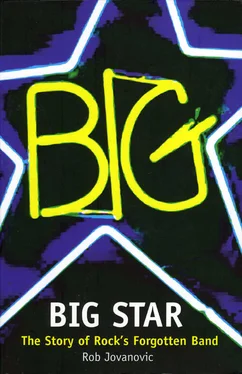The Story of Rock’s Forgotten Band

For Carolyn
Cover Page
Title Page Big Star The Story of Rock’s Forgotten Band
Prologue
1 ‘Why do you come so far?’
2 ‘They took our tickets and we didn’t get to see the Beatles’
3 ‘He wore a black T-shirt, nobody wore those, and torn jeans’
4 ‘All the way to Philadelphia to play on top of a hot-dog stand’
5 ‘We just figured we’d all be killed anyway’
6 ‘Bob Dylan never had anything on John Harold and he knew it’
7 ‘It really does sound like Todd Rundgren, but that’s not a bad thing’
8 ‘Mississippi didn’t like guys with long hair’
9 ‘The beer bottles were dancing across the tables’
10 ‘We got fired after the first show in Michigan’
11 ‘He turned to me and shot Demerol down his throat with a syringe’
12 ‘The singularly most heavy moment of my life’
13 ‘Look straight up to the ceiling and pretend we’re German opera singers!’
14 ‘Another stray American in London’
15 ‘Alex Chilton, Rock Legend, Back’
16 ‘He was rather nonplussed to be sought out while wearing a paper hat’
17 ‘It sounds like gun shots’
18 ‘We toasted his health with cheap beer and snacks from Taco Bell’
19 ‘We had to have girls because we were entertaining the troops’
20 ‘Without being overly threatening, I pushed him into a corner’
Postscript
Timeline
Discography
BIG STAR: ALBUMS
Concert List
Cover Versions
Bibliography
Notes
Thanks and Acknowledgements
Index
About the Author
Praise
Copyright
About the Publisher
In October 1972 the music world was full of contradictions. The previous months had seen number-one singles achieved by acts as diverse as Donny Osmond and Alice Cooper, Don McLean and Slade. Iggy Pop was holed up in a studio recording Raw Power and David Bowie had just given birth to Ziggy Stardust, but the album charts were dominated by heavy rock (Black Sabbath’s Vol 4 ), progressive rock (Yes’s Close To The Edge ) and inane pop (David Cassidy’s Cherish ). Since the Beatles had disbanded two years earlier, the short, catchy guitar-pop song had all but disappeared from vogue. But there was a quartet trying to keep that musical torch burning. Big Star, a Memphis band that took the best elements of the Beach Boys, the Beatles and the Byrds, was ploughing a lonely furrow against the popularity of seven-minute rock songs and lengthy, self-indulgent guitar solos. On this particular October evening they were playing a show to less than a hundred college students in a university sports hall in Oxford, Mississippi.
Like most of the shows that the band had already played, they got only an average response from the crowd. The vast majority of those in attendance had never heard a Big Star record but they did know who the lead singer was: Alex Chilton had sung a handful of hit singles with the Box Tops a few years before. For the show, Chilton, like drummer Jody Stephens, guitarist Chris Bell and bassist Andy Hummel, was wearing a casual shirt and jeans, had shoulder-length hair and was constantly fiddling around with his amplifier. This casual attire was at odds with the glammed-up sartorial excesses and lavish stage productions that the superstars of the day were blasting their audiences with. Tonight the three-pronged guitar attack drowned out Stephens’s melodic drumming and almost all of the vocals. It was the usual problem they faced having played so few shows together. On #1 Record, their recently released debut album, the balance was perfect. On vinyl the guitars chimed and the vocals soared. Here it was a battle that the vocals lost. And this was not helped by the obvious discomfort of the other vocalist, Chris Bell. At this point in his career he still hadn’t conquered his stage fright and his hands kept shaking violently.
During the quieter moments, such as when Chilton stepped forward to sing an acoustic version of ‘The Ballad of El Goodo’, the crowd talked over the top and downed beers. For the rest of the set they were happy to stomp along with the instantly catchy, rousing choruses of ‘Don’t Lie To Me’ and ‘When My Baby’s Beside Me’, even if they’d never heard them before. Lead vocal duties were shared between Chilton and Bell but all four band members sang back-up. Chilton’s vocals recalled the deadpan delivery of the Byrds’ Roger McGuinn while Bell’s were more like Led Zeppelin’s Robert Plant.
Big Star ran through all twelve songs from their only album, a couple of new songs called ‘Got Kinda Lost’ and ‘Back of a Car’ and added covers by T-Rex, the Kinks and Neil Young. At the end of the show, as the crowd filtered out, the band packed up their own equipment. Although this was only the band’s seventh live show, it would be the last with this line-up. Bell would quit before the end of the year; another album ( Radio City ) would be recorded by the remaining trio in 1973 before Hummel quit and then just Chilton and Stephens would be left of the original line-up to record the band’s third and final album of the 1970s.
Everyone who heard #1 Record agreed that it was a masterpiece, but a combination of bad luck and record-label mismanagement meant it was almost impossible for any fans reading the great reviews to actually buy a copy. Similar problems affected Radio City and by the third album things had untangled to such a degree that no one really cared any more and it would take four years for it to get any kind of release.
After the final break-up, the band’s music somehow managed to transcend their misfortune and in the late 1970s and 1980s Big Star began to take on cult status. Writers and musicians on both sides of the Atlantic began talking about this great band that most people had never even heard of and which they could only listen to on bootlegged cassettes. By 1992 the clamour had grown so great that their albums were issued on CD and the band finally received long overdue recognition, and sales, in the 1990s.
Now, thirty years after its demise, Big Star is hailed as a great band that just happened to have been in the wrong place at the wrong time. Given a little luck, their story might have been very different. Over time they have proved to be the missing link between the power-pop bands of the 1960s and the alternative rockers of the 1980s and 1990s. But back in 1972 no one was playing catchy three-minute guitar songs any more, especially back home in Memphis, where soul was king.
1 ‘Why do you come so far?’
Memphis, TN. Pre-1960
Unlike many US cities, Memphis has a rich and varied history. 1Wounded by civil war, it has survived widespread yellow-fever epidemics 2and been forced through the reconstruction and reform movements. But Memphis is best known for its music. The city is considered as the ‘Birthplace of the Blues’; it was a major player in the evolution of rock’n’roll and it has long been a hotbed of soul music. Many factors have contributed to the musical history of the city, with its geographical position 3and racial mix being two of major ingredients.
At the head of the Mississippi delta, as the river runs north to south – from Minnesota to the Gulf of Mexico – the city of Memphis spreads east from the river’s banks. Its position meant that it picked up a large amount of passing trade from migrating workers and entertainers travelling between Chicago and New Orleans. 4With drugs and drink easy to acquire and Beale Street’s thriving back-room gambling culture, the extra ingredient for patrons wanting a little excitement in their lives was sex. Memphis’s burgeoning whorehouse district was one of the only places where black men could sleep with white women. These establishments operated a white man’s curfew. At around two in the morning the whites went home and blacks were allowed in for the rest of the night.
Читать дальше












